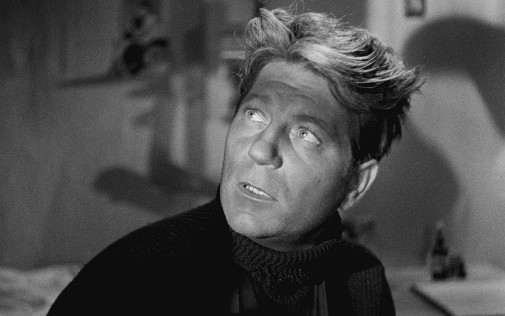
The 11th Academy Awards marked an important first in Oscar history. Jean Renoir's Grand Illusion, a French drama about class hierarchies and political strife in World War I, received a Best Picture nomination. It became the first non-English language film to ever do so. As we all know, it'd take 81 years for one such picture to win Hollywood's most coveted trophy, but we're not here to talk about Parasite's glorious victory as tempting as that is. Instead, our subject matter is one of French cinema's greatest stars, a brilliant actor that grew to be a cultural monument, the leading man of that historic '38 Best Picture nominee. Jean Gabin was a divinity of the Silver Screen, as magnetic as he was devastating…

Before his golden collaborations with Renoir, Jean Gabin, born Jean-Alexis Moncorgé, was already a star. He had humble beginnings as the laborer son of a café owner and a cabaret performer, starting his career in show business with a bit part in a Folies Bergères variety revue. After a stint in the military, the aspiring actor continued to earn employment on stage, touring across South America and performing on the Moulin Rouge while imitating the stylings of Maurice Chevalier. By the end of the 1920s, he had jumped from live performances to silent cinema, but it would be the advent of talkies that truly catapulted Gabin towards stardom.

In 1934, Julien Duvivier directed the actor in Maria Chapdelaine, a prestigious literary adaptation featuring a rural romantic triangle. That role proved to be Gabin's ticket to fame, and, in the following years, he'd appear in a series of other notable French classics. The Lower Depths marked his first work for Jean Renoir and it's one of Jean Gabin's greatest films, while 1937's Pepé Le Moko, directed by Duvivier, gave the actor his best characters until then and expanded his recognizability outside of France. In the same year, he starred in Grand Illusion, giving an Oscar-worthy performance in a rebellious role that would further help typify the Jean Gabin-type.
Roguish and rugged, often brutish, emanating an air of authority whether he's a criminal or a policeman, handsome but not beautiful, Gabin had a consistent star persona. However, he was always an actor before he was a celebrity and his performances never evidence the laziness of someone coasting by on charisma. If you doubt that, take a look at his work in Renoir's 1938 proto-noir La Bête Humaine. Playing against the luminous Simon Simone, Gabin breathes briny life into a man who wants to be gentle despite a marrow-deep predisposition towards violence. It's a miracle of acting externalizing a character's internal struggle with as much potency as poetry.

To write about all of Gabin's wonderful performances and even better films is an impossible task for this sort of write-up. We'd need the length of a book to do him justice. Still, we can offer some recommendations. In the late 30s, this thespian found another master of cinema worth his talents in Marcel Carné. 1938's Port of Shadows and 1939's Le Jour Se Lève are two of French cinema's most applauded classics after all. During the 40s, like many compatriots, Gabin went to Hollywood where he starred in Archie Mayo's coastal tragedy Moontide and Duvivier's The Imposter. Both productions flopped, prompting Jean Gabin to return to France where he fought against the occupying Nazis while keeping a romantic entanglement with Marlene Dietrich that lasted until 1948.
The postwar years marked a bit of a downturn in Gabin's popularity and professional success. Still, by the 1950s, he returned in grand style. For Max Ophüls, he did the beguiling Le Plaisir, for Jacques Becker, the gangster classic Touchez Pas au Grisbi. At this time, the actor had turned into something of an institution, symbolizing a tradition of French cinema for many auteurs and critics. In 1954's French Cancan, Jean Renoir made great use of this sense of monumental respectability mixed with autumnal sorrow, while later directors would often pair up Gabin with up-and-coming actors, staging metaphorical baton passes of French stardom. Alain Delon was one of such leading men who acted alongside the great Jean Gabin in films like Any Number Can Win and The Sicilian Clan.

Jean Gabin worked until he died in 1976, with Jean Girault's L'Année Sainte marking his last screen appearance. That being said, before concluding this love letter to a bygone actor, there should be a mention of two of his most iconic roles. In multiple movies from 1958 to 1963, he played Commissioner Jules Maigret, French literature's greatest detective and he's still the best iteration of the character for many devoted fans. There's another iconic role that Gabin perfected around the same time. I'm referring to Jean Valjean, the hero of Victor Hugo's Les Misérables. The actor played him in a 1958 epic which lacked in cinematic ingenuity but made up for it with a superb cast. Gabin's work is beyond perfect, embodying the spirit of an irascible and dangerous man who lives trapped inside his head, aiming to be better while being dragged down by the world's misery. Sorry Hugh Jackman, but Jean Gabin is the ultimate Valjean.

Are you a fan of this titan of French cinema? Would you have ever nominated him for an Oscar?